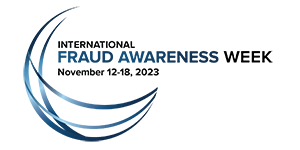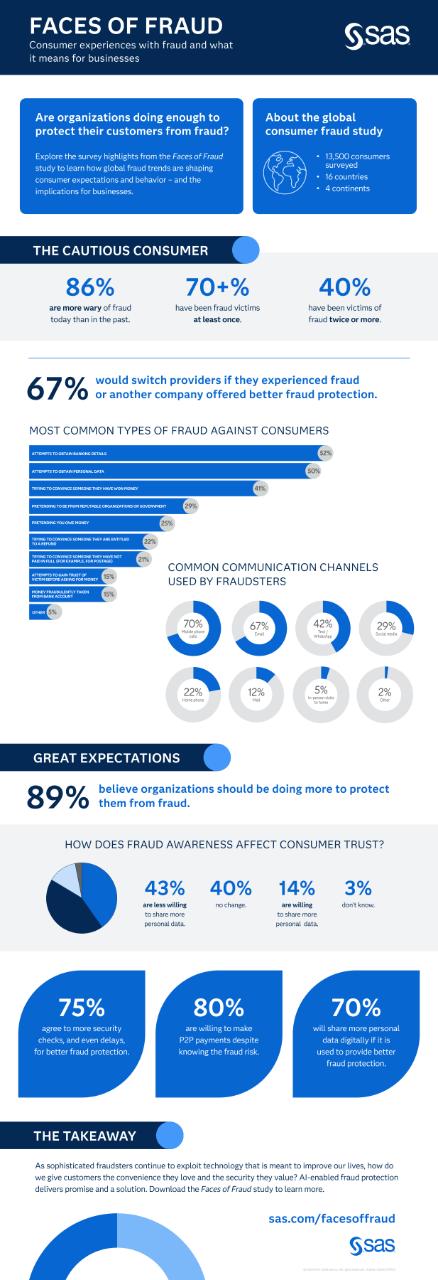Hope or hazard? Generative AI takes center stage for Fraud Week 2023.
As anti-fraud pros and organizations across industries unite around International Fraud Awareness Week, Nov. 12-18, SAS examines how the rise of generative AI will impact the global fraud landscape
As the sun rises on another International Fraud Awareness Week, Nov. 12-18, 2023, it shines on a world perhaps more fraud conscious than at any time in history. A recent consumer fraud study, based on a survey of 13,500 adults by AI and analytics leader SAS, revealed that:
- Seven in 10 people have fallen victim to fraud at least once; 40% reported suffering fraud twice or more.
- A vast majority (86%) are more wary of fraud now compared to previously.
- Three-quarters are fearful of experiencing future fraud.
“Even as consumers signal increased fraud vigilance, generative AI and deepfake technology are helping fraudsters hone their lucrative craft,” said Stu Bradley, Senior Vice President of Risk, Fraud and Compliance at SAS. “Phishing messages are becoming more polished. Replica websites look stunningly like the ones they mean to imitate. It takes just $5 and a few seconds of audio to clone someone’s voice with readily available online tools.”
Turning the tide on fraudsters: ways to engage
With stakes so high, SAS is again joining forces with the Association of Certified Fraud Examiners (ACFE) and more than 1,000 supporting organizations around one goal: to curb fraud and its financial and social harms by driving anti-fraud awareness and education. Seize these complimentary engagement opportunities to become more fraud savvy with SAS throughout Fraud Week:
- SAS webinar: The Fraud Arms Race: How Governments and Fraudsters are Battling for Advantage. Tuesday, Nov. 14, 8:30 a.m. ET (and later on demand). Join public sector experts from SAS to explore how fraudsters are using generative AI and other innovations to exploit and plunder – and discover the latest countermeasures governments worldwide are using to stop them.
- Live Twitter/X chat: What’s Next? Fraud & AML Trends for 2024 (and Beyond). Thursday, Nov. 16, 9 a.m. ET. Will generative AI live up to the hype? How will today’s prevailing digital fraud trends influence the anti-fraud tools and strategies used in sectors like banking, government, health care and insurance? Join SAS’ Stu Bradley and other cross-industry fraud experts on Twitter/X for a lively #SASchat.
- ACFE webinar: Fighting Financial Crime in the Generative AI Age. Friday, Nov. 17, 11 a.m. ET. Open for the first time to ACFE members and nonmembers alike, the ACFE will align experts from SAS, Datos Insights and Unconventional Ventures to examine the threats posed by generative AI’s explosive growth – and how organizations can mitigate them. Nonmember participation is limited to the live broadcast (register here); the webinar will be available on demand to ACFE members starting Dec. 7.
Supporters can also lend their voices on social media to share fraud fighting tips and resources from SAS. Follow #FraudWeek on Twitter/X for real-world expertise and discussions on a variety of fraud topics, including global fraud trends, the impacts of generative AI (good and bad), digital and payments fraud, identity crime, claims fraud, tax compliance, social program integrity, health care fraud and cost containment, and more.
“Anti-fraud professionals can’t afford to ignore the scams and frauds coming to the fore in these challenging economic times – nor can the organizations that employ them afford to disregard the public’s changing expectations around fraud protection,” said ACFE President John Gill. “Keeping up with anti-fraud innovation will be critical across industries as fraudsters take advantage of generative AI and other emerging technologies.”
SAS’ research showed how important fraud protection has become to consumers. “Consider that nine in 10 consumers think organizations should be doing more to safeguard them from fraud, and that two-thirds said they would change service providers due to a fraud experience or for better fraud protection,” Bradley said. “These proof points – and the real-world gains achieved by SAS customers – underscore the tremendous potential of businesses’ anti-fraud investments to help them grow and flourish.”
Using AI to stop financial fraud in real time
Beyond serving as Italy’s national postal service, Poste Italiane is among the country’s leading financial institutions, providing banking, insurance and even telecommunications services to 35 million customers. Protecting the 11 million customers who interact with Poste Italiane each day from fraud, abuse and improper payments is a foremost priority for the 160-year-old institution. That’s why the company uses advanced analytics and AI from SAS to detect fraud more precisely.
“Machine learning techniques provide that layer of intelligence that allows us to identify risk situations, analyze them very quickly and intervene when necessary,” said Raffaele Panico, Head of Fraud Management and Security Intelligence at Poste Italiane. “We have reduced false positives by 40% and increased our ability to handle anomalies by more than 20%.”
On the e-money side, Panico reported that Poste Italiane’s fraud ratio dropped by 50% in just three months after the launch of the anti-fraud service. “This is an astonishing figure, especially when we consider that in the last two years fraud has increased by 90% worldwide,” said Panico.
Improving claims fraud detection with predictive analytics and real-time decisioning
Since 2016, HDI Seguros has collaborated with SAS to combat evolving fraud risks and improve the customer experience. Using SAS solutions, the Brazilian insurer has transformed its existing anti-fraud system in recent years with new predictive modeling and decisioning tools to better identify and mitigate shifting fraud threats in real time.
These ongoing anti-fraud modernizations have helped HDI reduce false positives while improving its fraud detection rates. The insurer reported a 43% increase in the number of frauds identified from 2021 to 2022.
“SAS brought technology that helped us analyze external and internal data for greater accuracy,” said Leandro Bordon, Director of Operations and Claims at HDI Seguros. “We are able to look at the relationship network of fraudsters and customers with more intelligence, as it involves the complex interconnection of several elements, such as location, contacts, credit score, damages reported in the claim and other information.”
Enhancing anti-money laundering (AML) and fraud surveillance capabilities
By deploying SAS® Anti-Money Laundering on cloud-native AI platform SAS® Viya®, Treezor enhanced its AML and fraud surveillance capabilities. The European Banking-as-a-Service (BaaS) leader, based in Paris, operates in 25 countries, serving more than 100 fintech and large business customers. It has processed more than EUR€58 billion in transactions and issued more than 4.6 million payment cards.
Treezor deployed SAS Viya for monitoring transaction compliance, facilitating systematic coverage of anti-money laundering/countering the financing of terrorism (AML/CFT) and fraud risks. All teams, from compliance managers to analysts, collaborate on the platform, benefiting from prioritized alerts, robust case management capabilities and audit trail precision.
“Treezor plays a pivotal role in AML/CFT vigilance by reinforcing its monitoring capabilities, offering security to its customers and their end customers,” said Adin Buhks, Chief Risk and Compliance Officer at Treezor. “We are the first BaaS player to partner with SAS, who helped us implement a state-of-the-art solution in a tight time frame. Our AML analysts quickly adapted to the new solution, and the network capabilities are a game changer.”
Fighting tax evasion in freight transport
The Department of Economy of the State of Goiás in Brazil adopted SAS technology – SAS® Enterprise Guide® and SAS Visual Analytics on SAS Viya – to combat tax evasion in freight transport. The initiative uses monitoring and AI technologies to cross-check tax data in real time. Optical character recognition (OCR)-equipped antennas throughout the state’s highways enable the department to track roughly 30,000 cargo trucks daily.
Within a month of deployment, the system generated 300 alerts of possible tax inconsistencies each day. By better identifying irregularities – e.g., forged invoices, missing electronic manifests mandated for freight transport vehicles, and cargo exceeding declared quantity – the department increased fines by 54% compared to the same month last year.
“This project has greatly changed the department’s operational efficiency, bringing benefits to society and increased transparency for the department,” said Giovana Amorim Zanato, Manager of Prospecting and Auditing for the Department of Economy of the State of Goiás. “We combined SAS technology with other technologies to prevent tax evasion and created something innovative to serve as an example for other states’ departments.”
Curious to learn more about how SAS helps organizations fight fraud? Peruse fraud-focused white papers, solution briefs and more online.
SAS Hakkında
SAS ileri analitik alanında Dünya lideridir. SAS, yenilikçi yazılım ve hizmetlerle dünyanın her yerinden müşterilere veriyi zekaya dönüştürmeleri için destek ve ilham verir. SAS, dünyadaki müşterilerine “THE POWER TO KNOW (Bilmenin Gücü)” anlayışıyla hizmet vermektedir.
SAS ve tüm diğer SAS Institute Inc. ürün veya hizmetleri ABD ve diğer ülkelerde SAS Institute Inc.’in tescilli ticari markaları veya ticari markalarıdır. ® işareti ABD tescilini gösterir. Diğer marka ve ürün adları ilgili şirketlerin ticari markalarıdır. Telif Hakkı © 2019 SAS Institute Inc. Tüm hakları saklıdır.
Editorial contacts:
- SAS Türkiye
Selin Özdinç +90 212 403 52 44
SAS joins the ACFE and more than 1,000 supporting organizations in advancing anti-fraud resilience during Fraud Week, Nov. 12-18.
Click to see an enhanced, multimedia version of this announcement on MultiVu.
How is rampant fraud reshaping consumers' expectations – and what does it mean for businesses? Peruse key findings from the Faces of Fraud study.



